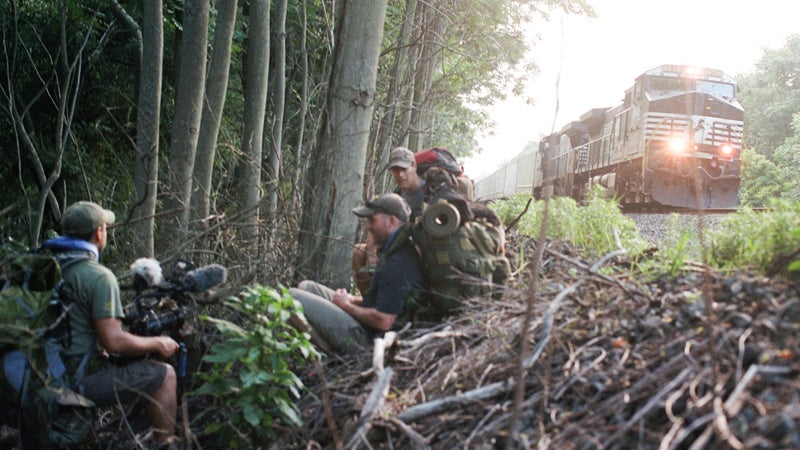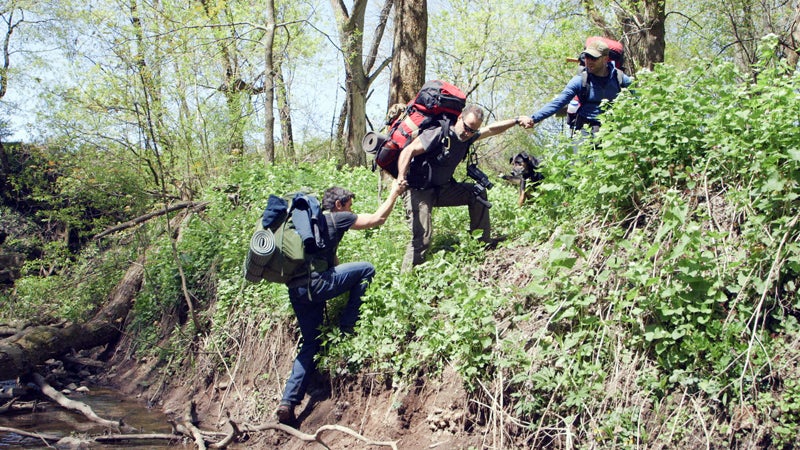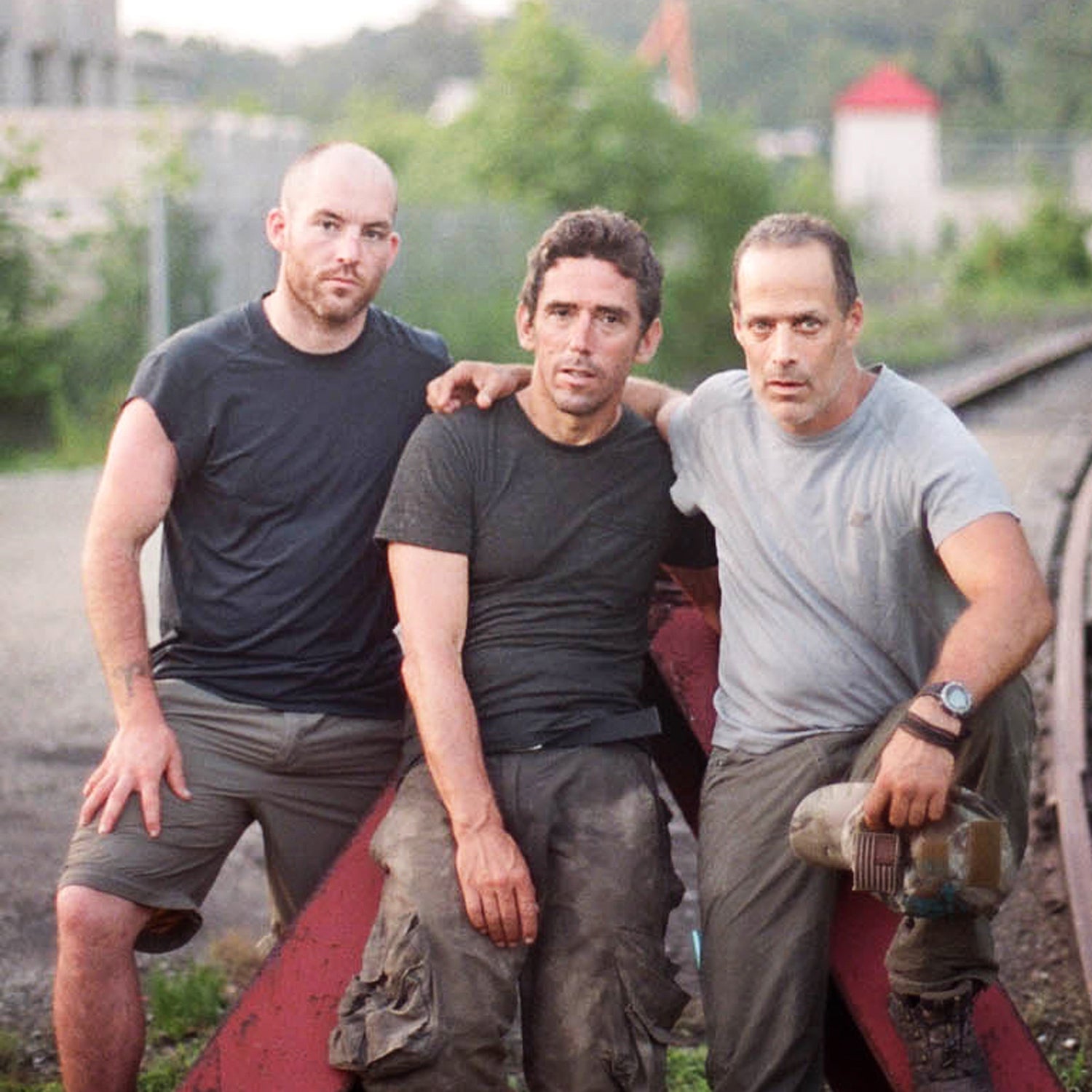Sebastian JungerŌĆÖs new film is a different kind of war documentary. , debuting November 10 on HBO, recounts an illegal multi-part hike along Amtrak lines in the American east that Junger took with three other combat veterans. This film concludes Junger’s film trilogy about combat, following and , the latter of which Junger co-directed with acclaimed war reporter, Tim Hetherington, who was killed covering the Libyan civil war in 2011.
Though Junger’s familiar themes of combat, fraternity, and manhood are present, The Last Patrol feels more introspective. Junger turns his journalistŌĆÖs eye not only on his backpacking buddies, the soldiers Brendan O’Byrne and Dan Roels and the photographer , who was by Hetherington’s side when he diedŌĆöbut also on himself, examining his own motives for the trip during a period of heightened personal turmoil. Abe Streep spoke with the Perfect Storm author about quitting war, conflict addiction, Amtrak cops, and, of course, what it means to be a man.
OUTSIDE: I was interested by how introspective this film is. How did it come about?
JUNGER: I just had this sort of lightbulb moment on the Amtrak, gazing out the windowŌĆöI realized you could walk along the tracks almost the entire way. I thought, oh, why donŌĆÖt we do a sort of high-speed vagrancy?
You originally planned to do the trip with Tim Hetherington. How much of a presence was he on the trip for you?
He was on my mind a little bit. I had a very strange sensation when we first started. I kept thinking we were missing someone. But it had been a few years since Tim died. The trip really wasnŌĆÖt about Tim. I was going to do it with him, and then I didnŌĆÖt, and I did it with these other guys. We were all processing losses weŌĆÖd had in combat and outside of combat. Half of us were in the middle of marriage breakups. Half of us had fathers who had just died. All of us had been in combat.
In the film Guillermo calls you the lost kid of the group.
Yeah.
ThatŌĆÖs not something that readers would associate with Sebastian Junger. YouŌĆÖve been on the cover of the magazine, and have been emblematic of a certain type of American masculinity. What do you feel when you hear him say that?
I think what happens with a lot of people, a lot of men, is that somewhere in their 40sŌĆöand IŌĆÖm 52 right nowŌĆöyou just canŌĆÖt avoid yourself anymore. Because life starts costing you something. You start losing marriages, you start losing friends, you start taking hits emotionally. On the patrol, I wouldnŌĆÖt say I was lost. But I was definitely disoriented, I had just lost my father weeks before we started. I had lost Tim. I was suffering some pretty significant emotional consequences from combat, you know, PTSD, and my marriage was breaking up. So, yeah, I was sort of all over the place.

In the film you have a run in with the Amtrak cop, and heŌĆÖs kind of bewildered. How was that?
He was extremely nice about it. I felt like he didnŌĆÖt quite know what to do with us. That was one of many times when we could have had more consequences. But the thing about railroad lines is that theyŌĆÖre straight. You can see a mile ahead of you and a mile behind you. So itŌĆÖs very, very hard for a patrol car to get anywhere close to you. You see a train, you see everything coming a mile a way and you just step into the woods. ItŌĆÖs so easy. ThereŌĆÖs that scene in the film when weŌĆÖre hiding in the woods and the patrol car goes by, and it couldnŌĆÖt have been simpler.
AmtrakŌĆÖs going to love this.
Yeah. We actually thank them in the credits.
Guillermo talked about the addictive nature of conflict and conflict reporting. It made me think of a line in Which Way Is The Front Line From Here?, the film you made about Tim. And Tim says something to the effect of IŌĆÖm not addicted to it. What are your thoughts about that? Is conflict addictive?
I think addictionŌĆÖs a little strong. Addiction is a chemical dependency. Literally, if you look at what the word means, itŌĆÖs a chemical dependency. So I wouldnŌĆÖt call it addictive. I mean, of course thereŌĆÖs a neurochemical thing that comes with risk, right? You get dosed with endorphins and that feels good. Of course. But I think more what happens is that you start to construct your identity around the idea that youŌĆÖre a risk taker. So when I stopped war reporting, the biggest thing I had to unhook from wasnŌĆÖt like some chemical addiction to adrenaline, it was something much more complex and profound, which was, ŌĆśHow do I redefine myself as someone whoŌĆÖs not taking risks and thereby setting himself apart and possibly above the rest of humanity because IŌĆÖm doing this super crazy, cool job?ŌĆÖ How do you dismantle that identity and just become a normal person again and retain your sense of excitement about yourself and your pride and all thatŌĆöhow do you do that? ItŌĆÖs really, really hard, and I think that is a much deeper problem than a chemical addiction to adrenaline.
HowŌĆÖs that process going for you?
I think it helps that IŌĆÖve turned into an old man all of the sudden. IŌĆÖm 52, last time I checked I was about 30. But seriously, I was just in a different place. Not necessarily physically, but just in my head. It’s just not appealing, that kind of risk, that kind of outward movement, out into the craziness of the world. I felt that very much in my 30s and I really donŌĆÖt anymore. IŌĆÖm much more introspective. ItŌĆÖs a change that I think a lot of people go through around my age, and it actually feels quite nice.

In the film thereŌĆÖs a lot of talk about what it is to be a man. You say itŌĆÖs to care for others more than yourselfŌĆö
You mean, youŌĆÖre less concerned with what happens to yourself and more concerned with what happens to others.
Sorry, right. Would that still be your answer?
ItŌĆÖs a very hard thing to actually articulate. Everyone tosses around this phrase: ŌĆ£Oh, come on, be a man about it.ŌĆØ But if you stop people and say, what exactly do you mean by, Be a man? Like, specificallyŌĆöwhat are you saying? No one can answer it. And that was my stumbling attempt to round up something that vaguely made sense. The best definition that IŌĆÖve heard comes from a woman IŌĆÖm friends with, her nameŌĆÖs , and sheŌĆÖs an evolutionary psychologist up in Boston. She does amazing research about the biological basis for gender difference. Her definition of a man is someone you want by your side when the enemy comes. ThatŌĆÖs a definition I think I can go with. Whatever form the enemy takes. It doesnŌĆÖt have to be a guy with a sword. But I think what Joyce was saying is: someone you can absolutely count on to defend the community from whatever it is. It might even be a metaphorical threat.
WhatŌĆÖs the community that you step up for?
One of the great things about these trips is that I had that old feeling, right, of mutual defense and inter-reliance. There was that one point in Pennsylvania when someone shot at us. And we sort of got behind cover and I grabbed the machete, and Brendan did something similar to what I was doing. I was absolutely enraged that someone was like shooting at my boys. I grabbed the machete and I started circling around way to the right to try to figure out who was shooting and I was going to come up behind them and incapacitate them. Brendan was doing the same thing on the other flank. It was such an immediate response. That felt good. Being in a group like that really felt good, and when I come home that doesnŌĆÖt exist. I donŌĆÖt think I do have a community, frankly, in that sense. I wish I did.


